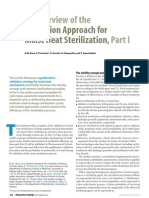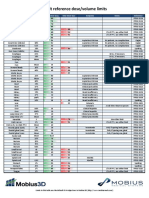Professional Documents
Culture Documents
Ethics Poster-Unethical Supervisor
Ethics Poster-Unethical Supervisor
Uploaded by
Luke LovejoyOriginal Description:
Copyright
Available Formats
Share this document
Did you find this document useful?
Is this content inappropriate?
Report this DocumentCopyright:
Available Formats
Ethics Poster-Unethical Supervisor
Ethics Poster-Unethical Supervisor
Uploaded by
Luke LovejoyCopyright:
Available Formats
The Unethical Supervisor
Luke Bullock, Tamar Horvitz, Aly Rasmussen, and Carmen Sepetka
Palo Alto University CLIN 610 Legal and Ethical Foundations
Federal
&
Case Study: Rationale for Topic: Ethical Decision-Making Model Applicable Codes & Laws State
Laws
A Practitioner's Guide to Ethical Decision Making Federal and State Laws
● According to a Authors: Holly Forester-Miller, Ph.D. & Thomas Davis, Ph.D.
18 US Code section 1035: False statements relating to health care matters – false, fictitious, or fraudulent statement or entry in connection with the delivery of or payment for health care benefits, items, or services, shall be fined
under this title or imprisoned not more than 5 years, or both.
California BPC § 4999.80: In order to carry out the provisions of this chapter, the board shall do all of the following: (a) Enforce laws designed to protect the public from incompetent, unethical, or unprofessional practitioners. (b)
Kathy, a student in the counseling program at Palo
Investigate complaints concerning the conduct of any licensed professional clinical counselor.
recent article A seven step EDM incorporating the work of Van Hoose and Paradise (1979), Kitchener (1984), Stadler (1986), California BPC § 4999.90: The board may suspend or revoke the license of any professional clinical counselor, if the applicant, licensee, or registrant has been guilty of unprofessional conduct, including (r) Any conduct in the
supervision of a registered associate, trainee, or applicant by any licensee that violates this chapter or any rules or regulations adopted by the board. (v) Failure to keep records consistent with sound clinical judgment, the standards of
the profession, and the nature of the services being rendered.
Haas and Malouf (1989), Forester-Miller and Rubenstein (1992), and Sileo and Kopala (1993)
Alto University was in the middle of her residency published by
2014 ACA Codes
A.1.a. Primary Responsibility: The primary responsibility of counselors is to respect the dignity and promote the welfare of clients.
The Ethical Decision-Making Model: A.1.b. Records and Documentation: Counselors create, safeguard, and maintain documentation necessary for rendering professional services.
when her supervisor asked her to do something American Step 1: Identify the Problem: this case exhibits an ethical and clinical problem. It also has the potential to
A.4.b. Avoiding Harm and Imposing No Harm: This code states that counselors have an ethical responsibility to avoid harming their clients and to not impose harm on them. Falsifying a diagnosis could potentially harm the client
by providing a diagnosis that does not accurately reflect their condition.
A.4.c. Professional Responsibility: This code requires counselors to uphold the highest standards of professionalism and follow ethical and legal standards. Falsifying a diagnosis is a violation of both ethical and legal standards.
become a legal problem.
Counseling
A.4.d. Respect for People's Rights and Dignity: This code emphasizes the importance of respecting clients' autonomy and treating them with dignity and respect. Falsifying a diagnosis could be seen as disrespectful to the client and
an infringement on their autonomy.
that made her feel uncomfortable. Her supervisor Step 2: Apply the ACA Code of Ethics: see adjacent section Applicable Codes and Laws.
B.6.a. Creating and Maintaining Records and Documentation: Counselors create and maintain records and documentation necessary for rendering professional services.
E.5.a. Proper Diagnosis: Counselors take special care to provide proper diagnosis of mental disorders. Assessment techniques (including personal interviews) used to determine client care (e.g., locus of treatment, type of treatment,
Association, “the Step 3: Determine the nature and dimensions of the dilemma: reflect on the values of autonomy, justice,
recommended follow-up) are carefully selected and appropriately used.
asked her to falsify a diagnosis for one of her
E.5.d. Refraining from Diagnosis: Counselors may refrain from making and/or reporting a diagnosis if they believe that it would cause harm to the client or others. Counselors carefully consider both the positive and negative
implications of a diagnosis.
most frequently
F.1.a. Client Welfare: Counseling supervisors monitor client welfare and supervisee performance and professional development.
beneficence, nonmaleficence, and fidelity. Conduct a literature review. Consult with peers and mentors. F.3.a. Supervisory Relationship—Extending Conventional: Supervisory Relationships Counseling supervisors clearly define and maintain ethical professional, personal, and social relationships with their supervisees.
clients so they would be covered by insurance. noted dilemma was
Step 4: Generate potential courses of action: consult with peers, mentors, and any other supervisors available.
If possible, speak with the supervisor directly. If necessary with HR present. File an official complaint with the
I.2.a. Informal Resolution: When counselors have reason to believe that another counselor is violating or has violated an ethical standard and substantial harm has not occurred, they attempt to first resolve the issue informally with
the other counselor if feasible, provided such action does not violate confidentiality rights that may be involved.
I.2.b. Reporting Ethical Violations: If an apparent violation has substantially harmed or is likely to substantially harm a person or organization and is not appropriate for informal resolution or is not resolved properly, counselors
take further action depending on the situation, such as referrals to state or national committees on professional ethics, voluntary national certification bodies, state licensing boards, or appropriate institutional authorities.
Kathy was shocked and confused. She couldn’t being directed to relevant board of behavioral sciences in your state if the issue is not resolved in an ethical manner.
I.2.c. Consultation: When uncertain about whether a particular situation or course of action may be in violation of the ACA Code of Ethics, counselors consult with other counselors who are knowledgeable about ethics and the ACA
Code of Ethics, with colleagues, or with appropriate authorities, such as the ACA Ethics and Professional Standards Department.
Step 5: Consider the potential consequences of all your options and determine a course of action: choose the
understand why her supervisor would ask her to do something by a least harmful option available to you. Resources For Practitioners:
do something unethical and illegal. She had supervisor or Step 6: Evaluate the selected course of action: Stadler (1986) suggests applying three tests: ● Consult with a trusted colleague or supervisor outside
1) test of justice: assess your own sense of fairness by determining whether you would treat others the same in of the situation to gain a different perspective and to
always believed that as a counselor, her primary administrator that this situation 2) the test of publicity: ask yourself whether you would want your behavior reported in the press 3) receive advice on how to proceed.
● Review the ethical guidelines and ACA to gain a
duty was to her clients and to help them in any the participant the test of universality: assess whether you could recommend the same course of action to another counselor in
the same situation.
better understanding of the expected standards and
how to handle ethical dilemmas.
deemed unethical”
way she could. She decided to talk to her Step 7: Implement the course of action: follow up and evaluate action efficacy after implementation. ● These agencies provide a range of resources,
(Burkholder et al., Note: Document all actions. including ethical guidelines, best practices,
supervisor about it and asked for an explanation. 2017).
research-based information, and consultation services.
Counselors can reach out to these agencies for
Her supervisor told her that the client in question Ways to Avoid This Dilemma: guidance, support, and advice on ethical and
professional issues.
was struggling financially and needed insurance ● Our group hoped
1. Seek clarification and understanding of the ethical guidelines and codes of conduct before starting the residency
to ensure that you understand the expected standards and how to handle ethical dilemmas that may arise.
1. American Counseling Association (ACA)
i. ACA Code of Ethics Resources
1. https://www.counseling.org/knowledge-cen
coverage to afford therapy. Kathy understood the to equip ourselves 2. Raise concerns or questions early and often with the supervisor or a trusted colleague. This can help to clarify
expectations and identify potential ethical issues before they become problematic.
ter/ethics/code-of-ethics-resources
2. National Board for Certified Counselors (NBCC)
reasoning but felt there might be better ways to with relevant 3. Discuss potential ethical issues during supervision meetings to gain guidance and support from a more
3. International Association of Marriage and Family
experienced counselor.
help the client than falsifying a diagnosis. What knowledge for our 4. Consider seeking a second opinion from a licensed counselor or mental health professional outside of the
Counselors (IAMFC)
4. American Psychological Association (APA)
residency program to get an unbiased perspective on the ethical dilemma.
should Kathy do? upcoming period of 5. Consider finding a diagnosis that applies accurately to the client, such as an other specified diagnosis.
5. National Institute of Mental Health (NIMH)
6. ACA Ethics Hotline
supervision. 6. Document any ethical concerns or issues that arise during the residency to maintain a record and provide
evidence of attempts to address the issue.
i. (800) 347 6647, ext 321
Literature Review & References
18 U.S. Code § 1035 - False statements relating to health care matters. (n.d.). LII / Legal Information Institute. Forester-Miller, H., & Davis, T. E. (2016). Practitioner’s guide to ethical decision making (Rev. ed.).
https://www.law.cornell.edu/uscode/text/18/1035 Retrieved from http://www.counseling.org/docs/default-source/ethics/practioner’s-guide-to
American Counseling Association. (2014). ACA code of ethics as approved by the ACA Governing Council. American Counseling ethical-decision-making.pdf
Association. https://www.counseling.org/knowledge-center/ethics Giovannetti, M., Sapp, T., & Jones, M. (2023). Supervision Tuneup: Ethical Considerations In Clinical
American Counseling Association. (2010). Procedures for processing complaints of ethical violations. Retrieved from Supervision. Counseling Today, 65, 22–24.
https://www.counseling.org/docs/default-source/center-resources/p_and_p_complaints_of_ethical_violations.pdf?sfvrsn=fe0c2 Governing Council. https://www.counseling.org/knowledge-center/ethics
92c_2
Publications, Inc. https://dx.doi.org/10.4135/9781071801154
Burkholder, J., Burkholder, D. B., & Gavin, M. (2020). The Role of Decision‐Making Models and Reflection in Navigating
Sheperis, D., Henning, S., & Kocet, M. (2016). Ethics and the Counseling Relationship. SAGE
Ethical Dilemmas. Counseling and Values, 65(1), 108–121. https://doi.org/10.1002/cvj.12125
Substance Abuse and Mental Health Services Administration (US). (2009). Chapter 1. Clinical
California Business and Professions Code. https://leginfo.legislature.ca.gov/
Supervision and Professional Development of the Substance Abuse Counselor - NCBI
Dahn, Vanessa. (2014). Unethical supervision practices and student vulnerability. Counseling
Bookshelf. https://www.ncbi.nlm.nih.gov/books/NBK64848/
Today. https://ct.counseling.org/2014/10/unethical-supervision-practices-and-student-vulnerability/
You might also like
- Orthodox Christian Icon Coloring BookDocument39 pagesOrthodox Christian Icon Coloring BookElenie98% (53)
- (SCPF) Code of Ethics - TEMPDocument11 pages(SCPF) Code of Ethics - TEMPAndrew SimmonsNo ratings yet
- Employment Law For Business 8th Edition Bennett Alexander Solutions ManualDocument26 pagesEmployment Law For Business 8th Edition Bennett Alexander Solutions ManualAmyClarkcsgz100% (67)
- Bible Reading Plan 1yrDocument12 pagesBible Reading Plan 1yrLuke LovejoyNo ratings yet
- Agricultural Engineering Law, Professional Ethics, Engineering Contracts and SpecificationsDocument43 pagesAgricultural Engineering Law, Professional Ethics, Engineering Contracts and SpecificationsNick ivan AlvaresNo ratings yet
- Corporate Manslaughter and Corporate Homicide: Scope for a New Legislation in IndiaFrom EverandCorporate Manslaughter and Corporate Homicide: Scope for a New Legislation in IndiaNo ratings yet
- Leg Reg Outline SheetDocument3 pagesLeg Reg Outline Sheetdp714100% (1)
- The Real Pearl-Sadhu Sundar Singh 1966Document28 pagesThe Real Pearl-Sadhu Sundar Singh 1966Luke LovejoyNo ratings yet
- Comparison of Orem and LeiningerDocument12 pagesComparison of Orem and LeiningercatislandbigredNo ratings yet
- HLTH3116 Week 1 Topic IntroductionDocument11 pagesHLTH3116 Week 1 Topic IntroductionPatrick NyagaNo ratings yet
- Apple Supplier Code of Conduct and Supplier Responsibility StandardsDocument127 pagesApple Supplier Code of Conduct and Supplier Responsibility StandardsSalinas Calderón Roberto CarlosNo ratings yet
- ABA Model Guidelines For Utilization of Paralegal ServicesDocument28 pagesABA Model Guidelines For Utilization of Paralegal ServicesVicky NoxNo ratings yet
- 2018 Code of Ethics PDFDocument5 pages2018 Code of Ethics PDFAloi DorojaNo ratings yet
- Final - Bad Faith SurveyDocument134 pagesFinal - Bad Faith SurveyJohnNo ratings yet
- Latin America: Understanding Regulatory Compliance Requirements Across The Life Science Industry (Pharmaceuticals, Biologics, Medical Devices, IVDs)Document4 pagesLatin America: Understanding Regulatory Compliance Requirements Across The Life Science Industry (Pharmaceuticals, Biologics, Medical Devices, IVDs)ComplianceOnlineNo ratings yet
- Salvanera, Jerwin - Legal Etchis - Asynnchronous ExerciseDocument3 pagesSalvanera, Jerwin - Legal Etchis - Asynnchronous ExerciseJohn David Linao GarciaNo ratings yet
- Casey Niblett 2015 The Death of Rules and StandardsDocument58 pagesCasey Niblett 2015 The Death of Rules and StandardsjaycyrzakNo ratings yet
- Unit EightDocument8 pagesUnit EightNabuteNo ratings yet
- Project PortfolioICTICT618 Project PortfolioDocument11 pagesProject PortfolioICTICT618 Project PortfolioNilesh Prasad100% (1)
- Khosla Ventures: On Disrupting Healthcare SectorDocument110 pagesKhosla Ventures: On Disrupting Healthcare SectorMohammed KhairyNo ratings yet
- P1 Notes ACCA 2010 PDFDocument10 pagesP1 Notes ACCA 2010 PDFNooReen BahadoorNo ratings yet
- Solution Manual For Employment Law For Business 8Th Edition by Bennett Alexander Hartman Isbn 0078023793 9780078023798 Full Chapter PDFDocument36 pagesSolution Manual For Employment Law For Business 8Th Edition by Bennett Alexander Hartman Isbn 0078023793 9780078023798 Full Chapter PDFmattie.scarborough137100% (10)
- Code of Ethics Azimut Benetti SpaDocument16 pagesCode of Ethics Azimut Benetti SpaTasos ArgyriouNo ratings yet
- Definition of Research: Per Se. Creative OutputDocument20 pagesDefinition of Research: Per Se. Creative OutputkaleemarzooNo ratings yet
- Gaceta OficialDocument3 pagesGaceta OficialcamaracomercioNo ratings yet
- Stage 1Document13 pagesStage 1tanziam66No ratings yet
- Offer LetterDocument4 pagesOffer LetterSiva Teja Dinakar TalluriNo ratings yet
- Fsu Thesis SearchDocument6 pagesFsu Thesis Searchfjgmmmew100% (2)
- Legal Pharmacy Module 3Document22 pagesLegal Pharmacy Module 3Senemela GonzalesNo ratings yet
- ConductDocument5 pagesConductapi-3836620No ratings yet
- Report Nhóm 1Document19 pagesReport Nhóm 1Phuong Anh PhamNo ratings yet
- Assignment Sem-4: Master of Business AdministrationDocument117 pagesAssignment Sem-4: Master of Business Administrationgagan cpmNo ratings yet
- Sample Questions and Answers On The Code of Professional ConductDocument10 pagesSample Questions and Answers On The Code of Professional Conductjiwa remajaNo ratings yet
- Literature Review On Code of ConductDocument6 pagesLiterature Review On Code of Conductea442225100% (1)
- Session 2 Topic 2 Power PointDocument22 pagesSession 2 Topic 2 Power PointsartzubyNo ratings yet
- Patent Vs Research PaperDocument5 pagesPatent Vs Research Paperafeasdvym100% (1)
- Code of Conduct & Business EthicsDocument14 pagesCode of Conduct & Business EthicsYuri Valdes- AlvarezNo ratings yet
- عيوب التشريع الخفيةDocument28 pagesعيوب التشريع الخفيةHM MohamedNo ratings yet
- Foundations of Canadian Business LawDocument235 pagesFoundations of Canadian Business Lawkinginthenorth283No ratings yet
- Company Law A: Where Leaders LearnDocument17 pagesCompany Law A: Where Leaders LearnM CNo ratings yet
- FPA GPG-03-V1-Adoption-and-use-of-AS1851-2012Document39 pagesFPA GPG-03-V1-Adoption-and-use-of-AS1851-2012eamNo ratings yet
- Data FiduciariesDocument2 pagesData FiduciariesKarmendra NarainNo ratings yet
- Employment Law For Business 8th Edition Bennett Alexander Solutions ManualDocument36 pagesEmployment Law For Business 8th Edition Bennett Alexander Solutions Manualtranhhanr87100% (33)
- TIA Standard: Telecommunications IP Telephony Equipment Voice Gateway Transmission Requirements TIA-912Document78 pagesTIA Standard: Telecommunications IP Telephony Equipment Voice Gateway Transmission Requirements TIA-912Anand KrishnaNo ratings yet
- Central Pangasinan Electric Cooperative, Inc. v. National Labor Relations CommissionDocument1 pageCentral Pangasinan Electric Cooperative, Inc. v. National Labor Relations CommissionOroNo ratings yet
- Ra 8981 SummaryDocument4 pagesRa 8981 SummaryLunabiNo ratings yet
- ISACADocument4 pagesISACAbabababbababaNo ratings yet
- It Is Not Disputed That After The Enactment of The Salary Standardization Law (Republic Act No. 6758 Became Effective On July 1, 1989), LawsDocument31 pagesIt Is Not Disputed That After The Enactment of The Salary Standardization Law (Republic Act No. 6758 Became Effective On July 1, 1989), Lawsanne6louise6panagaNo ratings yet
- Title Navigating Corporate Waters Unraveling The Indoor Management Rule in Company Law by Lubogo Isaac ChristopherDocument15 pagesTitle Navigating Corporate Waters Unraveling The Indoor Management Rule in Company Law by Lubogo Isaac ChristopherlubogoNo ratings yet
- Uvic Thesis GuidelinesDocument4 pagesUvic Thesis Guidelinesaflohdtogglebv100% (2)
- Week 1Document38 pagesWeek 1Poh Hui HoNo ratings yet
- Employment Law Research Paper OutlineDocument5 pagesEmployment Law Research Paper Outlinec9sqf3ke100% (1)
- Indian Compliance Laws For Textile IndustryDocument5 pagesIndian Compliance Laws For Textile IndustrySatadeep DattaNo ratings yet
- MTACode of EthicsDocument2 pagesMTACode of EthicsmanavchopraNo ratings yet
- Sem 2 LegalresearchDocument7 pagesSem 2 LegalresearchSumeeth sNo ratings yet
- Employment Law For Business 8th Edition Bennett-Alexander Solutions Manual Download PDF Full ChapterDocument54 pagesEmployment Law For Business 8th Edition Bennett-Alexander Solutions Manual Download PDF Full Chapterdqvolatswana100% (9)
- Studying Laws, Rules and Case Laws For Moot ProblemsDocument2 pagesStudying Laws, Rules and Case Laws For Moot ProblemssandeepNo ratings yet
- Ethics Case Writing: IPRO Team Ethics AssignmentDocument3 pagesEthics Case Writing: IPRO Team Ethics AssignmentArdeshir BahreininejadNo ratings yet
- Introduction & Learning Outcomes: Code of Professional Conduct and Ethical StandardsDocument11 pagesIntroduction & Learning Outcomes: Code of Professional Conduct and Ethical StandardsKasun ChathurangaNo ratings yet
- Chapter 4. Code of Ethics and Professional ConductDocument7 pagesChapter 4. Code of Ethics and Professional ConductPatrick MukalaziNo ratings yet
- Code of Ethics in Business Organizations: Grade 12Document9 pagesCode of Ethics in Business Organizations: Grade 12Joan Marie SalayogNo ratings yet
- 4TH Year Agency Course SyllabusDocument14 pages4TH Year Agency Course SyllabusvalNo ratings yet
- Ethical Foundations For Public Service: Part 1: Philosophy and PrinciplesDocument16 pagesEthical Foundations For Public Service: Part 1: Philosophy and PrinciplesDon Emmanuel NolascoNo ratings yet
- Statutes and Regulations: Relating To The Practices ofDocument316 pagesStatutes and Regulations: Relating To The Practices ofLuke LovejoyNo ratings yet
- Elder Porphyrios On The Nightingale's Song - Aaaron TaylorDocument5 pagesElder Porphyrios On The Nightingale's Song - Aaaron TaylorLuke LovejoyNo ratings yet
- Prayer at The Removal of A VentilatorDocument1 pagePrayer at The Removal of A VentilatorLuke LovejoyNo ratings yet
- Nativity Sermon of St. Gregory The TheologianDocument5 pagesNativity Sermon of St. Gregory The TheologianLuke LovejoyNo ratings yet
- Fr. Thomas Hopko's 55 Maxims For Christian LivingDocument1 pageFr. Thomas Hopko's 55 Maxims For Christian LivingLuke LovejoyNo ratings yet
- Orthodox Handbook On Ecumenism-Watermarked PDFDocument998 pagesOrthodox Handbook On Ecumenism-Watermarked PDFLuke Lovejoy100% (2)
- Patristics and The Postmodern in The Theology of John ZizioulasDocument9 pagesPatristics and The Postmodern in The Theology of John ZizioulasLuke LovejoyNo ratings yet
- Gregory of Nyssa Against Eunomius 3.3 ( 5)Document10 pagesGregory of Nyssa Against Eunomius 3.3 ( 5)Luke LovejoyNo ratings yet
- Bullock - Orthodox Church in Sumatra - FinalDocument22 pagesBullock - Orthodox Church in Sumatra - FinalLuke LovejoyNo ratings yet
- Bibliography of Alan Culpepper's WritingsDocument10 pagesBibliography of Alan Culpepper's WritingsLuke LovejoyNo ratings yet
- Feminism BibliographyDocument2 pagesFeminism BibliographyLuke LovejoyNo ratings yet
- Kallistos Ware - How To Read The BibleDocument5 pagesKallistos Ware - How To Read The BibleLuke Lovejoy100% (1)
- ST Isaac The Syrian: A Theologian of Love and MercyDocument20 pagesST Isaac The Syrian: A Theologian of Love and Mercyakimel100% (5)
- Keziah Elizabeth Siagian: Curriculum Vitae Replace With First Name(s) Surname(s)Document2 pagesKeziah Elizabeth Siagian: Curriculum Vitae Replace With First Name(s) Surname(s)KeiOnYTNo ratings yet
- Polymeric Drug Delivery TechniquesDocument64 pagesPolymeric Drug Delivery Techniquesmarcorrea9588100% (1)
- GE Com 5: Purposive Communication: Principal InvestigatorDocument5 pagesGE Com 5: Purposive Communication: Principal InvestigatorMichelle BaylosisNo ratings yet
- Public Health Advocacy Toolkit 07Document36 pagesPublic Health Advocacy Toolkit 07Ery SetiawanNo ratings yet
- CV TemplateDocument4 pagesCV TemplateWan HakimiNo ratings yet
- Risk Assessment: N C Tucker LTD Plastering 17/06/2019 NTDocument4 pagesRisk Assessment: N C Tucker LTD Plastering 17/06/2019 NTAngela DaveyNo ratings yet
- 2017 10Document200 pages2017 10Eduardo RomeroNo ratings yet
- Assessment On Curiosity and ExplorationDocument2 pagesAssessment On Curiosity and ExplorationNirmala SNo ratings yet
- Longevity British English Teacher Ver2Document6 pagesLongevity British English Teacher Ver2Anna PerepechaevaNo ratings yet
- Table of Specifications: Summative Test No. 1 in Science 10Document1 pageTable of Specifications: Summative Test No. 1 in Science 10Jannet FuentesNo ratings yet
- Biology Investigatory Project Viral DiseasesDocument20 pagesBiology Investigatory Project Viral DiseasesAchu Jaseem0% (2)
- Drug StudyDocument2 pagesDrug StudypaulotatsukamiNo ratings yet
- PMR Science Form 3 TipsDocument41 pagesPMR Science Form 3 TipsSuntharan MuniandyNo ratings yet
- Wiphan Ministry BriefDocument2 pagesWiphan Ministry Briefmlc100No ratings yet
- Care of Sick ChildDocument38 pagesCare of Sick ChildahmedNo ratings yet
- The Real Cost of Beauty IdealsDocument161 pagesThe Real Cost of Beauty IdealsTheodor Stefan FilipNo ratings yet
- Colleges in A.PDocument66 pagesColleges in A.PwhosworldisthisNo ratings yet
- @anesthesia Books 2018 AnaesthesiaDocument64 pages@anesthesia Books 2018 AnaesthesiaEva Garcia MartinezNo ratings yet
- Chapter 2 - Body CoordinationDocument13 pagesChapter 2 - Body CoordinationChai Wanzhen100% (1)
- FW10036 Aflatoxins in Nuts and Nut Products May 2010Document46 pagesFW10036 Aflatoxins in Nuts and Nut Products May 2010huong209No ratings yet
- Development of Occlusion (Seminar 1)Document47 pagesDevelopment of Occlusion (Seminar 1)Isha GargNo ratings yet
- Logiq P Series: Make It Easy. Make It Your OwnDocument2 pagesLogiq P Series: Make It Easy. Make It Your OwnNam LeNo ratings yet
- Fdar-Charting DatoonDocument5 pagesFdar-Charting DatoonDae Nicole Lizbette DatoonNo ratings yet
- Manila Standard Today - May 4, 2012 IssueDocument16 pagesManila Standard Today - May 4, 2012 IssueManila Standard TodayNo ratings yet
- SterilizationDocument5 pagesSterilizationFenil Desai100% (3)
- PEEP Positive End Expiratory Pressure and Its ConsequencesDocument2 pagesPEEP Positive End Expiratory Pressure and Its ConsequencesSadiq ZakariaNo ratings yet
- SeaView Support Systems Private LimitedDocument1 pageSeaView Support Systems Private LimitedrajgurumetalikNo ratings yet
- DVH LimitsDocument1 pageDVH LimitsDioni SandovalNo ratings yet
- Biomaterials For Dental ImplantsDocument136 pagesBiomaterials For Dental ImplantsAmit Bhargav100% (1)









































































































